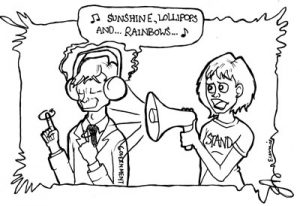Today, when we turn on our devices, tap into news cycles or even discuss world events, statistics and numbers litter our conversations about everything going around the world. We read about the Holocaust and watch movies about the Civil Rights Movement, cognizant of the struggles of our ancestors but fortunately and blissfully ignorant about the devastating and incredibly taxing experiences individuals had in such times of history. Even today when we sit behind our TV screens and computer monitors learning about things like the Syrian civil war and child trafficking in South Asia, we feel a fleeting moment of horror, but like most things, these incredibly tragic individual experiences of people take a back burner in the mundane details of our lives.
Watching the movie Perzania and the talk from POW veteran Philip gave me very similar feelings of guilt in both sessions and highlighted to me how we often get desensitized by the statistics and pictures and stories that are thrown at us everywhere we look. I had heard of the Gujarat riots and was horrified with the extent of casualties and fatalities in 2002, but watching the movie made me really reflect on the individual experiences of the victims of the crisis and how we often look at crises at a superficial level, bringing out our sympathy, but seldom, our empathy. Similarly, hearing Philip’s story about is experience as a prisoner of war, both during his 8 years of imprisonment with the torture methods as well as afterwards, made me think about how we take war and its violence for granted, almost discounting the lives of the soldiers due to the nature of war. I also realized how I actively seek to shut myself off from these kinds of details because of how they affect me emotionally and make me feel helpless in a brutal world. Perhaps we are desensitized from such conflicts because we only engage in information that is dehumanized, lacking identity and mathematical,
Moreover, both sessions compelled me to think if maybe opening myself up to these experiences and stories, other than making me feel helpless, which it did, also empowered me past my ignorance as I experienced empathy towards the individuals caught in these national headlines. Knowing the harrowing experiences behind such over publicized narratives, allowed and forced me to reflect deeper on such conflict and its many facets. Perhaps, rather than shielding ourselves from what makes us uncomfortable, exploring individual perspectives and details of the story alongside the larger narrative is what today’s audience truly needs.
In some way, we’re all dreaming in Perzania’s of our own, but we need to actively seek to wake up from it to one day perhaps ensure that we’re in living in one.

